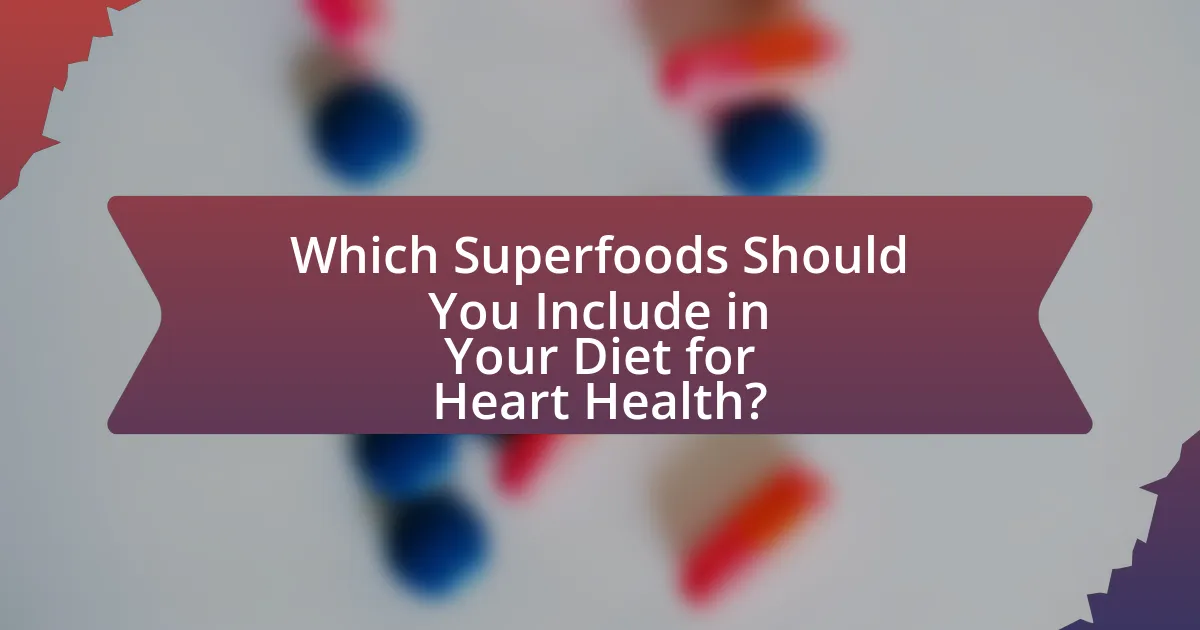Superfoods are nutrient-dense foods that offer significant health benefits, particularly for heart health, due to their high levels of antioxidants, vitamins, and minerals. This article explores the impact of superfoods such as fatty fish, berries, nuts, and leafy greens on cardiovascular health, highlighting their roles in lowering cholesterol, reducing inflammation, and improving blood pressure. Key nutrients like omega-3 fatty acids, fiber, and antioxidants are discussed, along with specific superfoods that support heart function and strategies for incorporating them into daily diets. The article emphasizes the importance of these foods in reducing the risk of heart disease and maintaining overall cardiovascular health.

What are Superfoods and How Do They Impact Heart Health?
Superfoods are nutrient-dense foods that provide health benefits, particularly for heart health, due to their high levels of antioxidants, vitamins, and minerals. These foods, such as berries, fatty fish, nuts, and leafy greens, can lower cholesterol levels, reduce inflammation, and improve blood pressure, contributing to a healthier cardiovascular system. For instance, studies have shown that omega-3 fatty acids found in fatty fish can significantly reduce the risk of heart disease by lowering triglyceride levels and preventing arrhythmias. Additionally, the antioxidants in berries can combat oxidative stress, which is linked to heart disease.
Why are Superfoods Important for Cardiovascular Health?
Superfoods are important for cardiovascular health because they are rich in nutrients that support heart function and reduce the risk of heart disease. These foods, such as berries, leafy greens, and fatty fish, contain high levels of antioxidants, omega-3 fatty acids, and fiber, which help lower cholesterol levels, reduce inflammation, and improve blood pressure. For instance, studies have shown that diets high in omega-3 fatty acids can decrease the risk of coronary artery disease by up to 30%. Additionally, the antioxidants found in superfoods can combat oxidative stress, a key factor in the development of cardiovascular diseases.
What Nutrients in Superfoods Support Heart Function?
Nutrients in superfoods that support heart function include omega-3 fatty acids, fiber, antioxidants, potassium, and magnesium. Omega-3 fatty acids, found in foods like chia seeds and fatty fish, help reduce inflammation and lower triglyceride levels, which are crucial for heart health. Fiber, present in oats and legumes, aids in lowering cholesterol levels and improving overall cardiovascular health. Antioxidants, such as those found in berries and dark chocolate, combat oxidative stress, which can damage heart cells. Potassium, abundant in bananas and spinach, helps regulate blood pressure, while magnesium, found in nuts and seeds, supports normal heart rhythm and muscle function. These nutrients collectively contribute to a healthier heart and reduced risk of cardiovascular diseases.
How Do Superfoods Compare to Regular Foods for Heart Health?
Superfoods generally offer greater benefits for heart health compared to regular foods due to their higher concentrations of essential nutrients, antioxidants, and anti-inflammatory compounds. For instance, foods like blueberries, fatty fish, and leafy greens are rich in omega-3 fatty acids, fiber, and vitamins that have been shown to lower blood pressure and reduce cholesterol levels. Research published in the Journal of the American College of Cardiology indicates that diets rich in these superfoods can significantly decrease the risk of cardiovascular diseases, highlighting their superior impact on heart health compared to standard dietary options.
What Role Do Antioxidants Play in Heart Health?
Antioxidants play a crucial role in heart health by neutralizing free radicals, which can cause oxidative stress and damage to cardiovascular tissues. This oxidative stress is linked to inflammation and the development of atherosclerosis, a condition characterized by the buildup of plaque in the arteries. Studies have shown that diets rich in antioxidants, such as those found in fruits, vegetables, and whole grains, can lower the risk of heart disease. For instance, research published in the Journal of the American College of Cardiology indicates that higher antioxidant intake is associated with reduced cardiovascular events. Thus, incorporating antioxidant-rich foods into the diet supports heart health by mitigating oxidative damage and promoting overall cardiovascular function.
Which Superfoods Are Rich in Antioxidants?
Superfoods rich in antioxidants include blueberries, kale, dark chocolate, and green tea. Blueberries contain high levels of anthocyanins, which are powerful antioxidants that help reduce oxidative stress. Kale is packed with vitamins A, C, and K, along with flavonoids that contribute to its antioxidant properties. Dark chocolate, particularly varieties with at least 70% cocoa, is rich in flavonoids that can improve heart health and combat free radicals. Green tea contains catechins, which are known for their antioxidant effects and potential to lower the risk of heart disease.
How Do Antioxidants Help Prevent Heart Disease?
Antioxidants help prevent heart disease by neutralizing free radicals, which can cause oxidative stress and damage to blood vessels. This oxidative stress is linked to inflammation and the development of atherosclerosis, a condition characterized by the buildup of plaque in the arteries. Studies have shown that diets rich in antioxidants, such as those found in fruits, vegetables, and whole grains, can lower the risk of heart disease. For instance, research published in the Journal of the American College of Cardiology indicates that higher intake of antioxidant-rich foods is associated with a reduced risk of cardiovascular events.

Which Superfoods Should You Include in Your Diet for Heart Health?
To promote heart health, you should include superfoods such as fatty fish, berries, nuts, and leafy greens in your diet. Fatty fish like salmon and mackerel are rich in omega-3 fatty acids, which have been shown to reduce the risk of heart disease by lowering triglyceride levels and reducing inflammation. Berries, particularly blueberries and strawberries, contain antioxidants and fiber that can improve cholesterol levels and blood pressure. Nuts, especially walnuts and almonds, provide healthy fats and have been linked to a lower risk of heart disease due to their ability to improve blood vessel function. Leafy greens, such as spinach and kale, are high in vitamins and minerals that support overall cardiovascular health. Studies have demonstrated that diets rich in these superfoods can significantly lower the risk of heart-related issues, making them essential components of a heart-healthy diet.
What Are the Top Superfoods for Heart Health?
The top superfoods for heart health include fatty fish, berries, nuts, seeds, and leafy greens. Fatty fish, such as salmon and mackerel, are rich in omega-3 fatty acids, which have been shown to reduce the risk of heart disease by lowering triglyceride levels and reducing inflammation. Berries, particularly blueberries and strawberries, contain antioxidants and fiber that can improve cholesterol levels and blood pressure. Nuts, especially walnuts and almonds, provide healthy fats and have been linked to lower heart disease risk. Seeds like flaxseeds and chia seeds are high in omega-3s and fiber, contributing to heart health. Leafy greens, such as spinach and kale, are packed with vitamins, minerals, and antioxidants that support cardiovascular function. Studies consistently demonstrate that incorporating these superfoods into a balanced diet can significantly enhance heart health and reduce the risk of cardiovascular diseases.
How Can Berries Benefit Your Heart?
Berries can benefit your heart by reducing blood pressure, lowering cholesterol levels, and improving overall cardiovascular health. These fruits are rich in antioxidants, particularly flavonoids, which have been shown to enhance endothelial function and reduce inflammation. A study published in the American Journal of Clinical Nutrition found that regular consumption of berries is associated with a lower risk of heart disease, highlighting that individuals who consume three or more servings of blueberries and strawberries weekly have a 32% lower risk of heart attack compared to those who consume fewer.
What Heart Health Benefits Do Leafy Greens Provide?
Leafy greens provide significant heart health benefits, including lowering blood pressure, reducing cholesterol levels, and improving overall cardiovascular function. These vegetables, such as spinach, kale, and Swiss chard, are rich in nutrients like potassium, which helps regulate blood pressure by counteracting sodium’s effects. Additionally, leafy greens contain fiber and antioxidants, such as vitamins C and E, which contribute to lowering LDL cholesterol and reducing inflammation in blood vessels. Studies have shown that a diet high in leafy greens is associated with a lower risk of heart disease, as evidenced by research published in the Journal of the American College of Cardiology, which found that increased consumption of these vegetables correlates with improved heart health outcomes.
How Do Nuts and Seeds Contribute to Heart Health?
Nuts and seeds contribute to heart health by providing essential nutrients, healthy fats, and antioxidants that reduce the risk of cardiovascular diseases. Specifically, they are rich in unsaturated fats, which help lower bad cholesterol levels, and contain omega-3 fatty acids, known to decrease inflammation and improve heart function. Studies, such as one published in the American Journal of Clinical Nutrition, indicate that regular consumption of nuts can lead to a 30-50% reduction in heart disease risk. Additionally, nuts and seeds are high in fiber, magnesium, and vitamin E, all of which support overall cardiovascular health by improving blood pressure and promoting healthy blood vessels.
Which Nuts Are Best for Cardiovascular Health?
Walnuts and almonds are the best nuts for cardiovascular health. Walnuts are rich in omega-3 fatty acids, which have been shown to reduce inflammation and lower blood pressure, contributing to heart health. A study published in the American Journal of Clinical Nutrition found that consuming walnuts can improve endothelial function and lower cholesterol levels. Almonds, on the other hand, are high in monounsaturated fats, fiber, and vitamin E, which can help reduce the risk of heart disease. Research from the Journal of the American Heart Association indicates that regular almond consumption is associated with lower levels of LDL cholesterol and improved heart health markers.
What Role Do Omega-3 Fatty Acids Play in Heart Health?
Omega-3 fatty acids play a crucial role in heart health by reducing inflammation, lowering triglyceride levels, and decreasing the risk of arrhythmias. Research indicates that these essential fats can significantly lower the risk of coronary heart disease. A study published in the Journal of the American College of Cardiology found that individuals who consumed omega-3 fatty acids regularly had a 30% lower risk of heart disease compared to those who did not. Additionally, the American Heart Association recommends consuming fatty fish, which are rich in omega-3s, at least twice a week to promote cardiovascular health.

How Can You Incorporate Superfoods into Your Daily Diet?
To incorporate superfoods into your daily diet, include them in meals and snacks consistently. For example, add berries, such as blueberries and strawberries, to your breakfast oatmeal or yogurt, as they are rich in antioxidants and linked to heart health. Incorporate leafy greens like spinach or kale into salads or smoothies, providing essential vitamins and minerals. Additionally, use nuts and seeds, such as walnuts and chia seeds, as toppings for salads or blended into smoothies for healthy fats and omega-3 fatty acids. Research indicates that diets rich in these superfoods can lower the risk of heart disease, as evidenced by studies published in the Journal of the American College of Cardiology, which highlight the cardiovascular benefits of a plant-based diet rich in these foods.
What Are Some Easy Ways to Add Superfoods to Meals?
Incorporating superfoods into meals can be easily achieved by adding ingredients like spinach, blueberries, and quinoa. Spinach can be blended into smoothies or added to salads, providing essential vitamins and minerals. Blueberries can be sprinkled on yogurt or oatmeal, offering antioxidants that support heart health. Quinoa serves as a nutritious base for salads or side dishes, delivering protein and fiber. These methods not only enhance the nutritional profile of meals but also contribute to overall heart health, as supported by studies indicating that diets rich in fruits, vegetables, and whole grains can reduce cardiovascular disease risk.
How Can Smoothies Be a Great Source of Superfoods?
Smoothies can be a great source of superfoods because they allow for the easy incorporation of nutrient-dense ingredients like leafy greens, berries, nuts, and seeds. These ingredients are rich in vitamins, minerals, antioxidants, and healthy fats, which contribute to heart health. For example, spinach and kale provide essential vitamins K and A, while berries are high in antioxidants that can reduce inflammation and lower blood pressure. Additionally, adding chia seeds or flaxseeds introduces omega-3 fatty acids, known for their cardiovascular benefits. This combination of superfoods in smoothies not only enhances nutritional intake but also promotes overall heart health effectively.
What Recipes Feature Superfoods for Heart Health?
Recipes that feature superfoods for heart health include quinoa salad with spinach and walnuts, salmon with avocado salsa, and oatmeal topped with berries and flaxseeds. These recipes incorporate ingredients known for their heart-healthy properties; for example, quinoa is high in fiber and protein, spinach is rich in antioxidants, walnuts contain omega-3 fatty acids, salmon is a source of healthy fats, and berries are packed with vitamins and antioxidants. Studies have shown that diets rich in these superfoods can lower cholesterol levels and reduce the risk of heart disease, supporting their inclusion in heart-healthy recipes.
What Tips Can Help You Maintain a Heart-Healthy Diet?
To maintain a heart-healthy diet, focus on incorporating fruits, vegetables, whole grains, lean proteins, and healthy fats. Research indicates that diets rich in these food groups can lower the risk of heart disease. For example, the American Heart Association recommends consuming at least five servings of fruits and vegetables daily, as they are high in fiber and antioxidants, which support cardiovascular health. Additionally, choosing whole grains over refined grains can improve cholesterol levels and reduce heart disease risk. Lean proteins, such as fish and poultry, provide essential nutrients without excessive saturated fat, while healthy fats from sources like avocados and nuts can help lower bad cholesterol levels.
How Can Meal Planning Support Your Heart Health Goals?
Meal planning can significantly support heart health goals by promoting the consumption of nutrient-dense foods while reducing the intake of unhealthy options. By organizing meals in advance, individuals can ensure they include heart-healthy superfoods such as fruits, vegetables, whole grains, and lean proteins, which are known to lower cholesterol levels and reduce blood pressure. Research indicates that diets rich in these foods can decrease the risk of heart disease; for example, a study published in the Journal of the American College of Cardiology found that a Mediterranean diet, which emphasizes meal planning around healthy fats and plant-based foods, is associated with a 30% reduction in cardiovascular events. Therefore, effective meal planning not only facilitates better dietary choices but also aligns with established guidelines for heart health.
What Common Mistakes Should You Avoid When Choosing Superfoods?
When choosing superfoods, avoid common mistakes such as relying solely on marketing claims without verifying nutritional benefits. Many products are labeled as “superfoods” but lack substantial evidence supporting their health benefits. For instance, a study published in the Journal of Nutrition found that not all foods marketed as superfoods provide the same level of nutrients or health advantages, emphasizing the importance of research. Additionally, overlooking the overall dietary context can lead to imbalanced nutrition; superfoods should complement a varied diet rather than replace whole food groups. Lastly, ignoring personal health conditions, such as allergies or dietary restrictions, can result in adverse effects, as certain superfoods may not be suitable for everyone.
What Are the Best Practices for Consuming Superfoods for Heart Health?
The best practices for consuming superfoods for heart health include incorporating a variety of nutrient-dense foods such as berries, fatty fish, nuts, and leafy greens into your daily diet. These superfoods are rich in antioxidants, omega-3 fatty acids, and fiber, which have been shown to lower cholesterol levels and reduce inflammation, contributing to better cardiovascular health. For instance, a study published in the Journal of the American College of Cardiology found that regular consumption of fatty fish, which is high in omega-3s, can significantly decrease the risk of heart disease. Additionally, it is advisable to consume these superfoods in their whole form rather than processed versions to maximize their health benefits.





